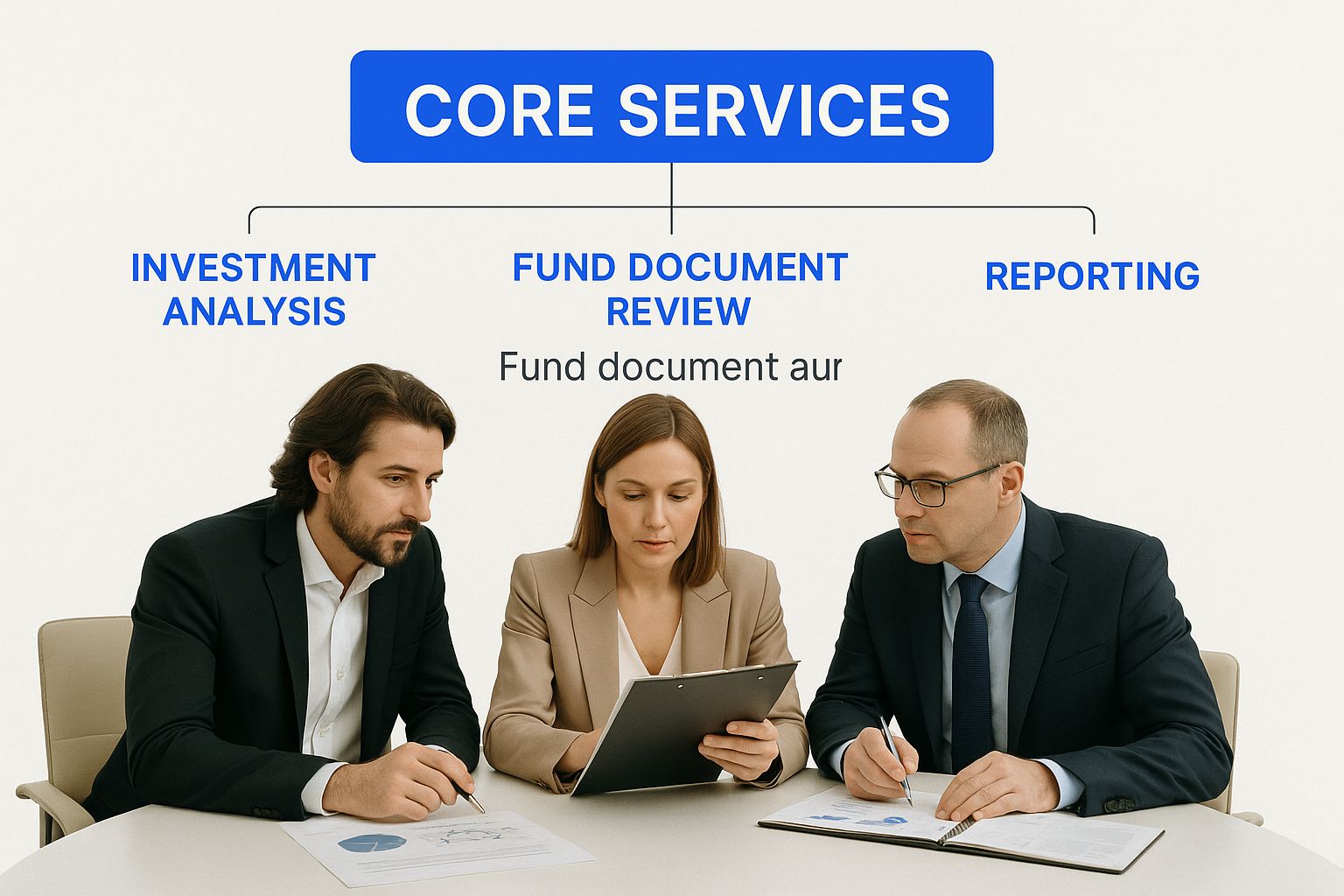Learn what is a fund administrator and how they manage NAV calculation, investor services, and investment operations. Your complete guide.

Think of a fund administrator as the unsung hero of the investment world. They are the independent, third-party experts who handle all the critical operational grunt work that keeps an investment fund running smoothly, accurately, and legally. They are the essential scorekeepers, ensuring every detail, from investor transactions to fund valuation, is handled with precision and without bias.
If a fund manager is the star quarterback making the big plays, the fund administrator is the entire offensive line—the powerhouse crew doing the essential, often unnoticed work that makes victory possible. They create the stable foundation that allows the fund manager to focus purely on investment strategy.
This team is the independent party responsible for the meticulous work that protects investors and ensures the fund runs like a well-oiled machine. Their role brings order to incredibly complex processes, making them a non-negotiable part of modern finance.
The real magic of a fund administrator is their objectivity. Since they have no skin in the game regarding investment decisions, they can provide a completely unbiased and accurate report card on the fund's performance. This separation of duties is what builds and maintains investor trust.
Their core responsibilities typically break down into a few key areas:
By taking all these complex operational duties off the fund manager's plate, the administrator allows them to do what they do best: find and manage great investments. It’s a classic case of specialization leading to greater efficiency and expertise for everyone involved.
Grasping this foundational role is the first step to seeing why they're so indispensable. For a more detailed breakdown, you can explore essential insights on what fund administration entails and how it supports a fund's entire lifecycle.
Ultimately, the administrator serves as the operational backbone, providing the structure, reliability, and trust necessary for any investment fund to operate and grow. Their work ensures the entire financial engine is firing on all cylinders.
Think of a fund administrator as the operational backbone of an investment fund. While the fund manager is busy making strategic investment decisions, the administrator is the one behind the scenes, ensuring everything runs smoothly, accurately, and by the book. They're more than just number-crunchers; they are the independent, third-party guardians of a fund's financial integrity.
This independent oversight is what builds investor confidence and satisfies regulators. In fact, their role has become so essential that today, over 70% of hedge funds rely on them for core tasks like NAV calculation. That's a huge jump from just 40% a decade ago, showing just how critical their independent validation has become.
The responsibilities of a fund administrator are deeply interconnected, with each function supporting the others to create a seamless operational environment.

As you can see, precise accounting forms the bedrock for everything from investor reporting to regulatory compliance. Let's break down these core responsibilities.
The following table provides a clear overview of the essential duties a fund administrator handles.
| Responsibility | Description |
|---|---|
| Fund Accounting | Maintains the fund’s official books and records, tracking all transactions, assets, liabilities, and expenses. |
| NAV Calculation | Periodically calculates the Net Asset Value (NAV) per share, which is the official price for fund transactions. |
| Investor Services | Manages investor subscriptions and redemptions, maintains the shareholder register, and handles all official communications. |
| Compliance & Reporting | Prepares and files regulatory reports, coordinates annual audits, and ensures the fund adheres to all legal requirements. |
These tasks work together to create a robust framework that supports the fund's growth and protects its investors.
At the very core of a fund administrator's world is fund accounting. They are responsible for meticulously maintaining the fund’s official set of books. Every single transaction—from buying an asset to paying an operational expense—is tracked with precision. This detailed record-keeping is the foundation upon which everything else is built.
From these official books, the administrator performs its most famous function: calculating the Net Asset Value (NAV). The NAV is the fund's official "per-share" market value, and it's typically calculated on a set schedule, like daily, weekly, or monthly.
Think of the NAV as the official, audited price tag for one share of the fund. An accurate and independently verified NAV is non-negotiable. It guarantees that every investor buying in or cashing out does so at a fair, consistent, and unbiased price.
This independent calculation is crucial because it eliminates potential conflicts of interest, giving everyone involved—from investors to regulators—complete confidence in the fund’s reported value.
Beyond crunching the numbers, the fund administrator is often the primary point of contact for the fund's investors. This is a vital, client-facing role that has a direct impact on investor satisfaction and trust.
Their investor services typically include:
For certain fund structures, like those in the private markets, these services can be even more complex. You can dive deeper into these specifics in our guide to private equity fund administration.
Finally, a fund administrator plays a massive part in keeping the fund on the right side of the law. They are experts in the complex web of financial regulations and work diligently to ensure the fund remains compliant with all relevant authorities, like the SEC.
This means preparing and filing a wide range of regulatory reports to provide necessary transparency. They also prepare the fund’s official financial statements and work closely with external auditors during the annual audit process. By expertly managing these compliance duties, they shield the fund and its managers from the risk of eye-watering fines and serious reputational damage.

Not too long ago, the world of fund administration was buried under mountains of paperwork. Think overflowing file cabinets, endless spreadsheets, and the constant, tedious work of manual data entry. That era is quickly fading. Today, technology is completely overhauling the industry, allowing us to shift focus from mind-numbing manual tasks to high-value strategic work. It’s not just about getting things done faster—it’s about building a smarter, safer, and more transparent foundation for fund operations.
The biggest driver of this change? Automation.
Platforms like Fundpilot were built specifically to take on the repetitive, everyday tasks that used to be a major source of human error and frustrating bottlenecks. We're talking about things like data reconciliation, generating investor reports, and processing capital calls. When you automate these workflows, you get a huge boost in both accuracy and speed.
This shift frees up talented professionals to do what they do best: think. Instead of spending days just double-checking numbers, they can now dig into performance trends, model out future scenarios, and give fund managers the kind of deep insights that actually drive decisions. For any fund looking to grow, that kind of operational efficiency is priceless.
We're moving beyond simple automation into something much more powerful. Artificial intelligence (AI) and machine learning are no longer just buzzwords; they've become essential tools for the modern fund administrator.
At its core, integrating technology like this accomplishes a few key things. It cuts down on risk, sharpens decision-making, and builds a rock-solid operational backbone that can grow right alongside the fund.
And the evolution doesn't stop there. By 2025, technologies like AI and blockchain are expected to bring even greater efficiency and transparency to the industry. One of the most exciting trends on the horizon is asset tokenization, which some analysts predict could represent 10% of global assets by 2030.
Blockchain, in particular, could be a game-changer. It creates a secure, unchangeable ledger for transactions, which makes audits simpler, reduces arguments, and gives investors more confidence by creating a single, verified source of truth.
By adopting these powerful tools, firms can radically simplify their back-office work. If you're interested in learning more about smart financial management, take a look at our guide on how to reduce operational costs with proven strategies. Ultimately, technology is empowering the fund administrator to evolve from a simple record-keeper into a true strategic partner who helps fuel a fund's growth.
Fund managers are experts at spotting great investments, so a natural question comes up: why not just handle their own administration? The answer boils down to the most valuable currency in finance: trust. Bringing in an independent fund administrator creates a separation of powers that is absolutely essential for building investor confidence.
Think of it like having a referee in a big game. Both teams are there to win, but the referee is the impartial party making sure everyone plays by the rules. A fund administrator does the same for an investment fund, ensuring objectivity and transparency for all the players involved.
The most critical piece of this is the unbiased calculation of the fund's Net Asset Value (NAV). When a third party with no financial stake in the fund's performance calculates its official value, it completely removes any hint of a conflict of interest. This impartial validation is the foundation of both investor trust and regulatory compliance.
Beyond just being an objective third party, a specialized administrator brings a depth of knowledge that most fund management teams simply don't have in-house. Keeping up with the complex and ever-changing world of financial regulations is a full-time job on its own. A good administrator lives and breathes these rules, which protects the fund from making expensive compliance mistakes.
This expertise also covers operational best practices. They’ve honed their processes for everything from managing investor communications to preparing for annual audits, making sure every task is handled professionally and efficiently.
An independent fund administrator isn't just a service provider; they are a strategic partner in building credibility. Their sign-off on financial reports sends a powerful message to investors and regulators: these numbers are accurate, reliable, and free from internal bias.
This partnership becomes even more important as private capital markets continue to grow. Investors are demanding more transparency and institutional-quality operations than ever before.
The screenshot below from Belasko captures just how dynamic the private capital markets are, showing major shifts in both deal value and the number of funds closing.
These trends really highlight why having a solid operational backbone is so crucial. A skilled administrator provides that infrastructure, giving fund managers the confidence to navigate this complexity.
Finally, outsourcing administration offers a huge operational and financial leg up. Trying to build an in-house team with the right skills and technology is a massive undertaking, requiring a heavy upfront investment in salaries, software licenses, and training.
Partnering with an administrator gives a fund immediate access to things it couldn't otherwise afford.
This model lets fund managers run a lean operation and pour their resources into what they do best—sourcing deals and managing investments. It creates a clear path for growth, allowing even smaller funds to project an institutional-quality image that attracts bigger, more sophisticated investors and builds lasting trust.

Picking a fund administrator isn't just another item on your to-do list; it’s one of the most important decisions you'll make for your fund. The right partner directly impacts your operational efficiency, credibility, and investor relationships. Think of them less as a vendor and more as a foundational part of your team—a strategic partner invested in your growth.
So, where do you start? The first and most obvious place is their technology. Are they stuck in the past, running your fund's critical operations on clumsy spreadsheets? Or have they embraced modern, automated platforms like Fundpilot that handle routine work for you? Automation isn't just a nice-to-have; it significantly cuts down on human error in essential tasks like NAV calculation and investor reporting, leading to a much smoother and more reliable experience for everyone.
Next, you need to look closely at their track record and specialization. A firm that’s an expert in hedge funds might be completely out of its depth with the nuances of a private equity or venture capital fund. You need an administrator who has already walked the path you're on and has proven experience with your specific fund type and asset class.
Choosing an administrator is like hiring a key team member. Their skills, experience, and cultural fit must align with your fund's long-term vision to ensure a successful and scalable partnership.
A rock-solid reputation for accuracy, responsiveness, and top-notch client service is absolutely essential. Don't just take their word for it. Ask for references and actually talk to their current clients to get an honest, real-world perspective on how they perform under pressure.
The private capital market is always in motion. Recent data, for example, highlights a fascinating shift: while the value of private equity and venture capital deals jumped 18.7% year-over-year, the number of new funds closing actually shrank by 55%. This points to a market of fewer, but much larger and more complex funds, which in turn ramps up the operational pressure. Your administrator must be ready to handle this complexity, a trend detailed in recent insights on private capital trends.
To make a smart choice, structure your evaluation around a few core pillars:
The gap between traditional fund administration and modern, automated services is widening. While manual processes were once the only option, they now introduce unnecessary risks and inefficiencies that platforms like Fundpilot are designed to solve.
Here's a quick comparison to see the difference:
| Feature | Traditional Manual Administration | Automated Service (e.g., Fundpilot) |
|---|---|---|
| Data Entry & NAV | Manual data input into spreadsheets; high risk of human error. | Automated data ingestion and calculations; minimal errors. |
| Investor Reporting | Time-consuming manual report creation; slow distribution. | Instant, automated report generation and distribution via a portal. |
| Capital Calls | Labor-intensive process involving emails and manual tracking. | Automated capital call notices, tracking, and reconciliation. |
| Accessibility | Limited access to data; information provided on a delayed basis. | 24/7 real-time access to data and reports via an investor portal. |
| Scalability | Difficult and expensive to scale as the fund grows. | Seamlessly scales with your fund without a linear increase in cost. |
| Security | Relies on email and basic file storage; higher security risks. | Bank-grade security, encrypted data, and secure access controls. |
Ultimately, a structured approach helps you look beyond just the price tag. By thoroughly vetting potential administrators against these criteria, you can choose a partner who will not only meet your needs today but also support your long-term goals and help you build unshakable investor trust.
Even after you get the basic idea, it's natural to still have a few questions about what a fund administrator actually does. Let's tackle some of the most common points of confusion head-on to give you a crystal-clear picture of this essential role.
A great way to think about it is to compare a fund to an airline. The fund manager is the pilot—they're the one flying the plane, making the big strategic decisions about where to go and how to get there to reach the destination (i.e., generating returns).
So, where does the administrator fit in? They're the air traffic control tower. The administrator manages all the complex ground operations, ensuring everything is safe, orderly, and running by the book. They're the ones making sure the entire journey is smooth and compliant from takeoff to landing.
While they work together, their jobs are kept separate for a very important reason: objectivity.
This strict separation of duties is what gives investors real confidence. It assures them that the fund’s reported performance is accurate and hasn't been influenced by the very people making the investment decisions.
The independence of a fund administrator is the absolute foundation of investor trust. Simple as that.
When the team calculating the fund's value has no skin in the game, it's a guarantee that the Net Asset Value (NAV) is determined without bias. This third-party verification eliminates conflicts of interest and shows investors that the fund operates on a level playing field.
Think of it this way: without an independent administrator, a fund manager would essentially be grading their own homework. That’s a massive conflict of interest that would make it nearly impossible to attract and keep serious investors.
This role isn't one-size-fits-all, either. A skilled administrator knows how to tailor their services, whether it's for a hedge fund that needs a daily NAV or a private equity fund with complicated capital calls and distributions. They ensure the back office runs smoothly, no matter how unique the fund's strategy is.
Ready to move beyond messy spreadsheets and manual processes? Fundpilot empowers emerging managers with institutional-grade reporting, automated administration, and a seamless investor portal. Discover how Fundpilot can elevate your fund operations today.